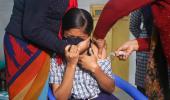Amid an uptick in daily cases of COVID-19 in Delhi and the positivity rate going beyond 2 per cent, there has been a rise of nearly 48 per cent in the number of home isolation cases here in the last one week, according to official data.

On Thursday, the number of home isolation cases stood at 574 while 325 new coronavirus cases were recorded with a positivity rate of 2.39 per cent.
Official sources said patients of all age groups and both working professionals and students, are getting infected and under home isolation.
They, however, did not specify as to which age-group was particularly getting affected.
The daily cases have been on the rise in the last few days while the positivity rate here has been registered in excess of one per cent since April 4 when it had stood at 1.34 per cent.
As the Covid positivity rate in the national capital has jumped from 0.57 per cent on April 1 to 2.39 per cent on April 14, the number of home isolation cases has shown an upward trend in the last one week.
On April 8, the city had reported 146 cases with a positivity rate of 1.39 per cent and 388 patients were under home isolation, according to the data shared by city health department authorities.
The count of home isolation cases has steadily increased in this period, rising to 574 on April 14.
The corresponding figures on April 11 was 447 and on April 13 it had stood at 504.
There has been a rise of nearly 48 per cent in the home isolation cases in the last one week.
'Very few people are now going for a Covid test, and only those with extreme symptoms are opting for it. Testing cannot be imposed on people and transit testing at stations and bus depots, shelters, etc, are not being done. And, those getting symptoms are not going for test, and only those with co-morbidities going to hospitals that too if there is a severity, so home isolation cases count have risen,' an official source said.
Many doctors have also said that very few people are going for a Covid test after onset of symptoms and people are now 'preferring to recuperate at home'.
Meanwhile, Delhi heath minister Satyendar Jain said on Friday that all hospitals have been advised to remain alert in view of the rise in coronavirus cases, while asserting that they are fully prepared to tackle the situation.
According to an officials statement, Chief Minister Arvind Kejriwal said the government is keeping a close eye on the situation.
"Hospital admissions are not increasing, so there is no need to panic. Nothing to worry about as of now," he stressed.
'The Delhi government is closely monitoring the situation and the government does not want to take any risk. We have completely overhauled our health infrastructure. Along with this, all hospitals have been advised to remain alert amidst increasing cases of corona in Delhi,' Health Minister Jain was quoted as saying in the statement.
He also said the Delhi government is conducting contact-tracing of patients to prevent the spread of infection.
'At the same time, RTPCR testing will also be increased if needed. To prevent the spread of Corona, the Delhi Government is working on the principle of test, trace and treat,' the health minister was quoted as saying.
The health minister also advised people to wear a mask while stepping out, and also get vaccinated at the earliest.
'Prevention is better than cure. All those who have not yet taken the vaccine or have taken only the first dose, should be taken to their nearest health facility as soon as possible for complete vaccination,' he said.
Noting that the XE variant has not been included in the list of 'Variants of Concern' by the World Health Organisation, he said that there is no need to panic.
About 37,000 Covid beds and 10,594 COVID ICU beds have been prepared in Delhi, the government statement said.
'If the infection spreads, the government has planned to increase 100 oxygen beds in every ward of Delhi within two weeks. In such a situation, the Delhi government plans to prepare 65,000 beds, so that no person has to face shortage of beds in an emergency situation,' said the government statement.
If cases rise again, the home isolation system will be implemented, it said.
'During the previous waves of the corona pandemic, the home isolation system proved to be extremely beneficial for patients. In view of this, if the cases increase again, the home isolation system will be implemented.
'Patients with mild coronavirus symptoms will get better treatment at home. CDV teams, along with ANM, ASHA and paramedical workers, will visit the homes of coronavirus-infected patients and inform them about being under home isolation and on taking necessary precautions. Teams will assess a patient's health and will provide home isolation kits with oximeters. Tele-caller teams will call them in the morning and evening to get health-related information of a patient. If the patient's condition is critical, they will be immediately admitted to the hospital,' it said.
Kejriwal was quoted as saying in the statement that 'number of people being admitted to hospitals is not increasing' and there is 'nothing to worry about right now'.
Doctors on Tuesday had said that it was 'not a panic situation' as the count of daily cases was still low, but had cautioned against dropping the guard.
But with a rise in the positivity rate, there is a parallel increase in the number of home isolation cases too.
Delhi's COVID-19 tally and the death toll due to the disease had stood at 18,67,206 and 26,158 respectively on Thursday, according to official data.
On Monday, the positivity rate had stood at 2.7 per cent, the highest in two months. It was 2.87 per cent on February 5.
The number of daily Covid cases in Delhi had touched a record high of 28,867 on January 13, during the third wave of the pandemic.
The city had recorded a positivity rate of 30.6 per cent on January 14, the highest during the third wave of the pandemic, which was largely driven by the highly transmissible Omicron variant of the coronavirus.
The number of home isolation cases on February 1 had stood at 12,312. By late February, the number of patients under home isolation here had gradually fallen.
On February 24, the home isolation cases count had stood at 1,559, registering a steep fall in the figures.
It subsequently fell further, only to record a rise again in April.











 © 2025
© 2025